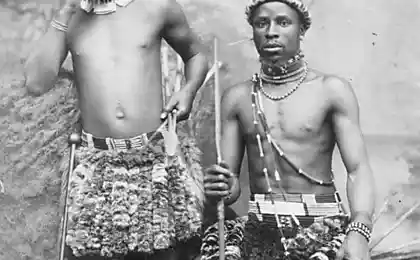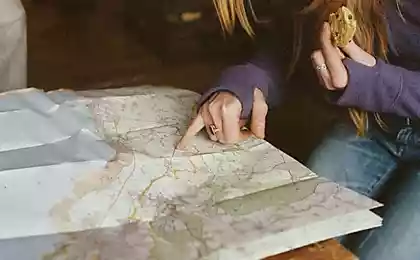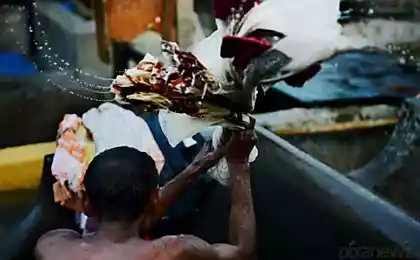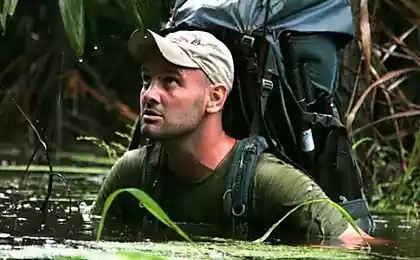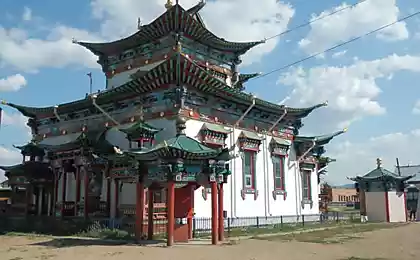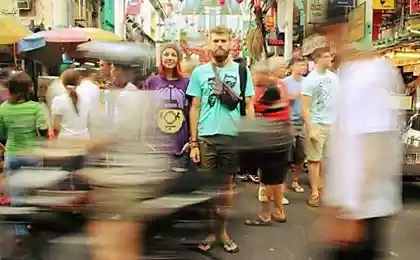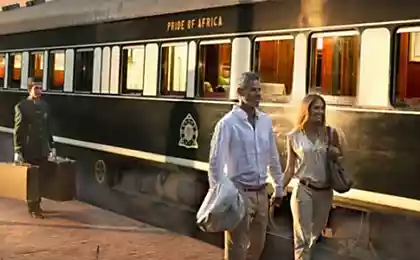1442
Washerwomen faniko
One of the attractions of Abidjan, capital of Côte d'Ivoire are faniko laundress. In the language of Dioula "Fanny" means "cloth, clothing," and "to" - "to wash." It turns out faniko - is "the one who washes clothes." Laundress there are only men as the work is hard, and women can be found only in the soap factories.
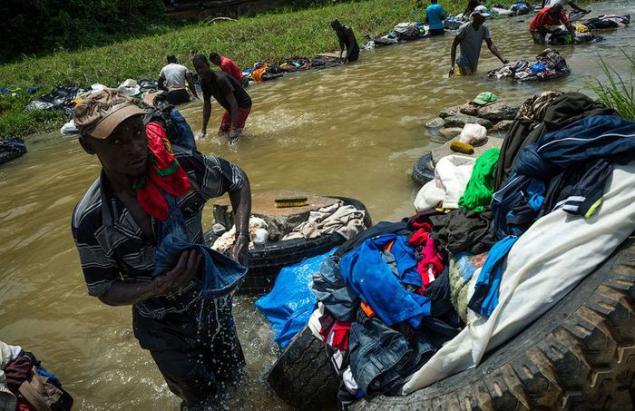
Long before dawn faniko bypasses the house to collect a job for the day. Some clients live in 3 km from the river. We have to put things in a wooden cart or tie into a knot and set up on his head. Faniko then forwarded to the Banco River.
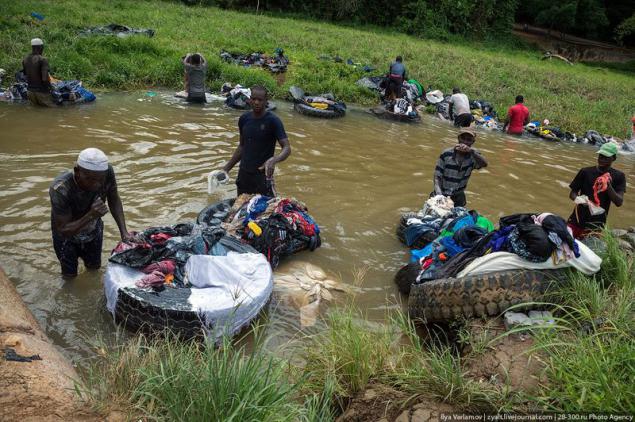
At what cost the services of such facilities? Wash the shirt is 0, 07 dollars (2 Russian ruble) and a sheet - 0, $ 14 (4 rubles). It is understandable why faniko have to dial himself so much work.
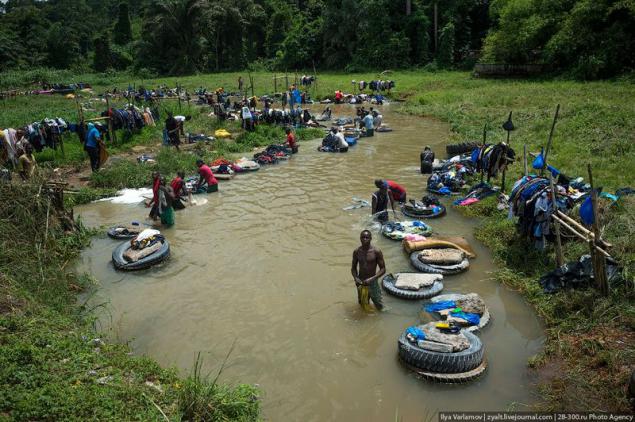
Laundry is unthinkable without soap from palm oil. Therefore, the novice taught to use it properly. They are used three different kinds of soaps with different colors: white and yellow - for lightly soiled fabrics, black - for very dirty. The black soap stains its main ingredient - palm oil. As each day faniko spends no less than ten pieces, perched near mylovar. Soap making - not a simple matter, it starts at six in the morning. In the local market ahead of time bought the necessary materials: condensed palm oil, lye, salt, juice Annonas, cocoa butter and coconut. These eco-friendly substances merge into the pot and simmer over the fire. About six hours soapy concoction comes to the condition, and poured into tin forms. When after a few hours the soap hardens, it is cut in large pieces.
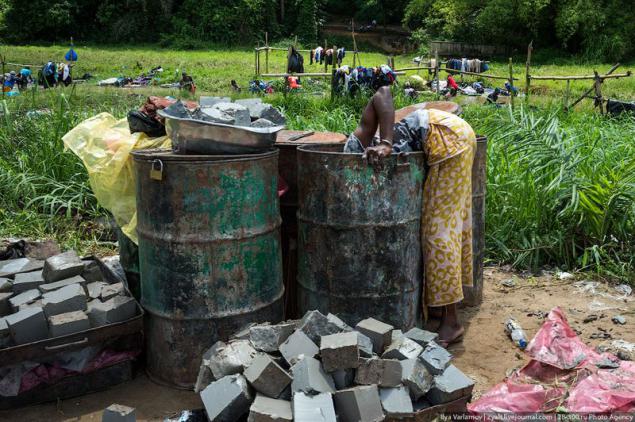
Then the soap-worker puts the goods in a plastic bowl, put it on his head and down to the river. But when the washer to buy soap, if it is busy with work? A woman comes up to his waist in the river, launches its basin and sells soap washer, keeping them from working.
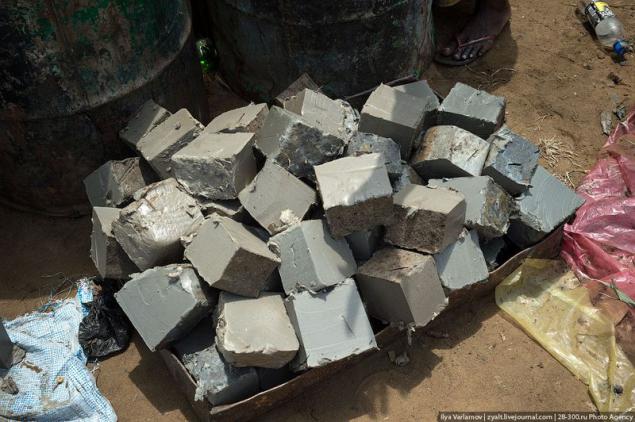
Looking at the huge pile of laundry, involuntarily ask how they are stored, where is whose?
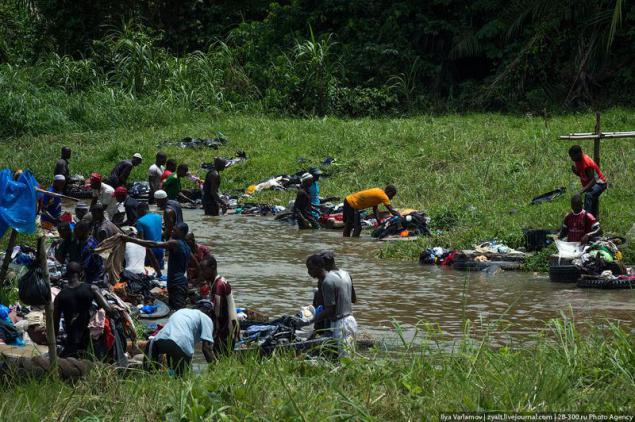
Firstly, when the washerman collects things for washing, he notices the size of clothing for each member of the family, to remember who owns what. No labels or tags. Then on each garment one family he ties knots in the same place, such as the left or right sleeve, collar or belt. While washing clothes, he adds, taken from one court, in a separate pile. We still think it is too difficult. "Faniko never lose things!»
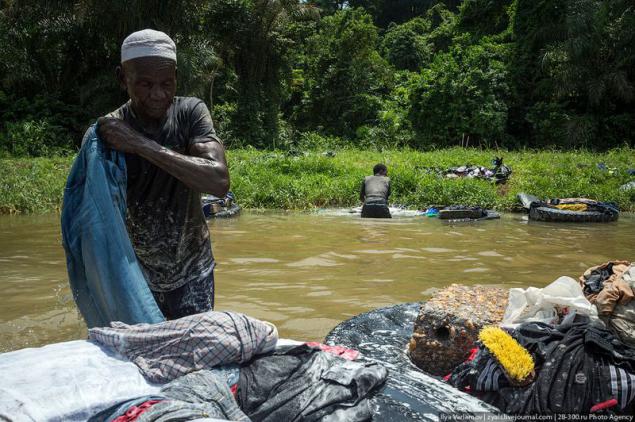
Can anyone come in and start washing in the waters of the river bank? Not at all! First you need to go through the whole procedure. Future faniko must pass a three-month trial period, during which he teaches a veteran washing. During this time, a novice master the science of remembering. If he does not succeed, he will have to look for work elsewhere. But those who show skill will be able to buy for a modest fee workplace - recessed into the water bus, which no one but he has no right to use.
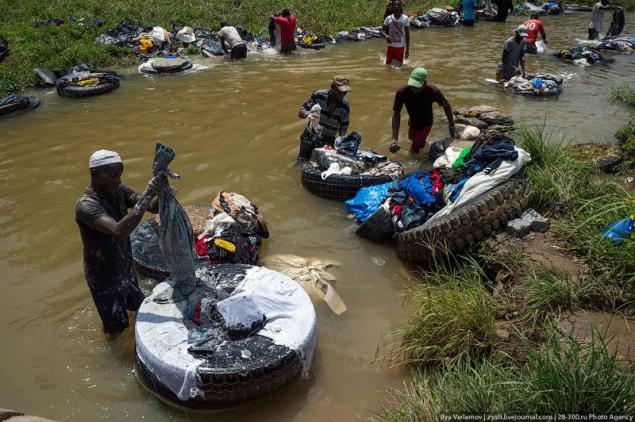
If you go here, be prepared that you will have to extort money for filming.
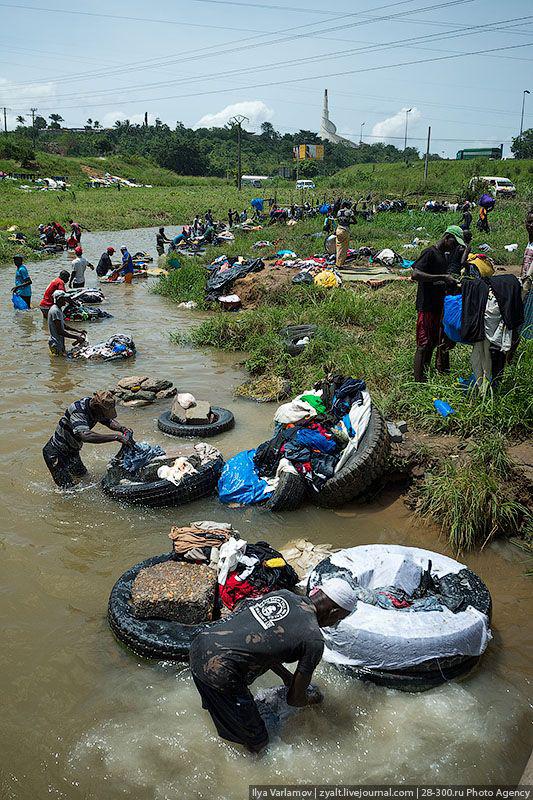
It is only in appearance it seems that everything is not organized. In fact, here everyone has a clear place has protection, head, etc. Rules about how to market.
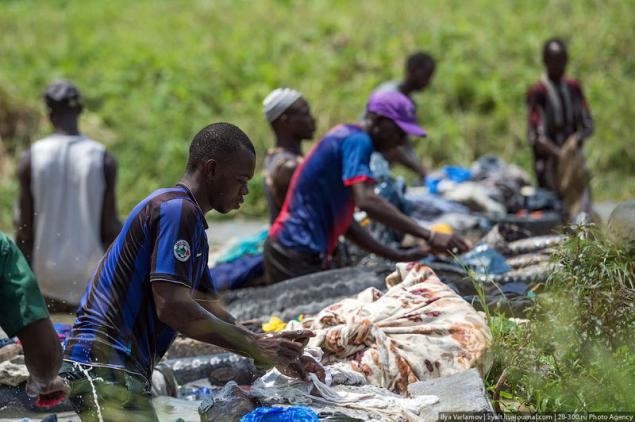
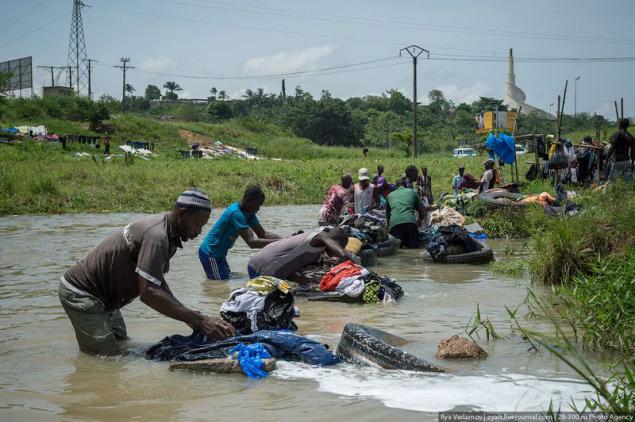
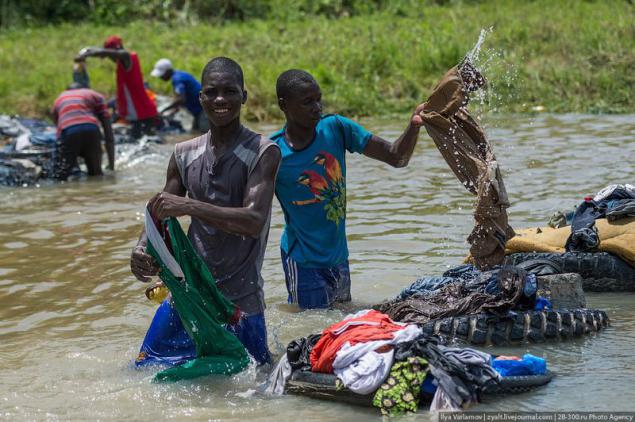
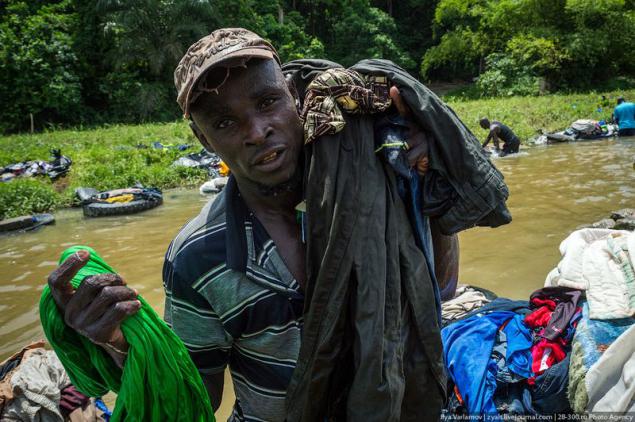
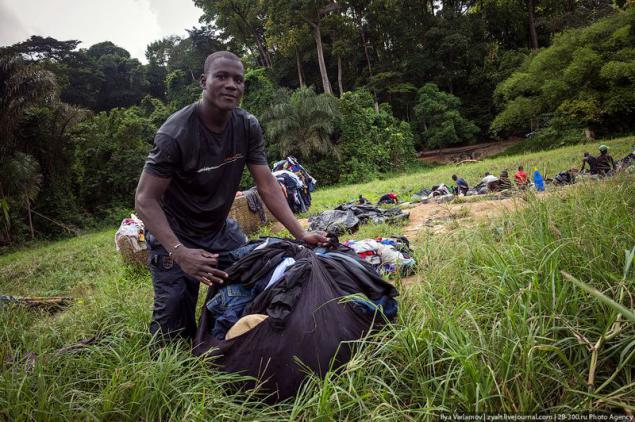
When finished washing, faniko sent to the hillside and lay on the grass freshly washed things or hangs on what they have. Later in the afternoon, when all the laundry dries, he carefully folds it, sometimes even smoothes Zharov iron. At the end of the day, he collects clean, ironed things in a knot, and delivers them to the owners.
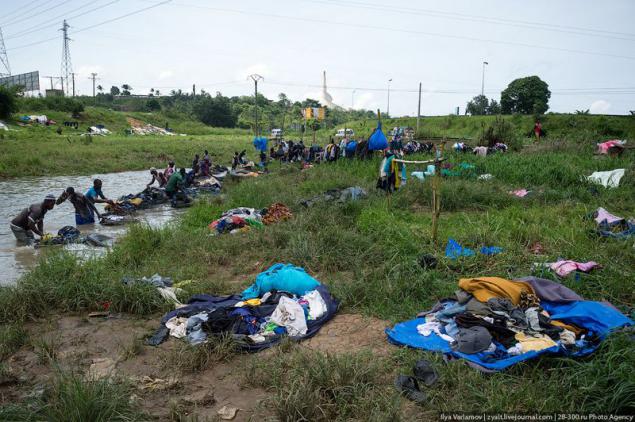
Source: zyalt.livejournal.com

Long before dawn faniko bypasses the house to collect a job for the day. Some clients live in 3 km from the river. We have to put things in a wooden cart or tie into a knot and set up on his head. Faniko then forwarded to the Banco River.

At what cost the services of such facilities? Wash the shirt is 0, 07 dollars (2 Russian ruble) and a sheet - 0, $ 14 (4 rubles). It is understandable why faniko have to dial himself so much work.

Laundry is unthinkable without soap from palm oil. Therefore, the novice taught to use it properly. They are used three different kinds of soaps with different colors: white and yellow - for lightly soiled fabrics, black - for very dirty. The black soap stains its main ingredient - palm oil. As each day faniko spends no less than ten pieces, perched near mylovar. Soap making - not a simple matter, it starts at six in the morning. In the local market ahead of time bought the necessary materials: condensed palm oil, lye, salt, juice Annonas, cocoa butter and coconut. These eco-friendly substances merge into the pot and simmer over the fire. About six hours soapy concoction comes to the condition, and poured into tin forms. When after a few hours the soap hardens, it is cut in large pieces.

Then the soap-worker puts the goods in a plastic bowl, put it on his head and down to the river. But when the washer to buy soap, if it is busy with work? A woman comes up to his waist in the river, launches its basin and sells soap washer, keeping them from working.

Looking at the huge pile of laundry, involuntarily ask how they are stored, where is whose?

Firstly, when the washerman collects things for washing, he notices the size of clothing for each member of the family, to remember who owns what. No labels or tags. Then on each garment one family he ties knots in the same place, such as the left or right sleeve, collar or belt. While washing clothes, he adds, taken from one court, in a separate pile. We still think it is too difficult. "Faniko never lose things!»

Can anyone come in and start washing in the waters of the river bank? Not at all! First you need to go through the whole procedure. Future faniko must pass a three-month trial period, during which he teaches a veteran washing. During this time, a novice master the science of remembering. If he does not succeed, he will have to look for work elsewhere. But those who show skill will be able to buy for a modest fee workplace - recessed into the water bus, which no one but he has no right to use.

If you go here, be prepared that you will have to extort money for filming.

It is only in appearance it seems that everything is not organized. In fact, here everyone has a clear place has protection, head, etc. Rules about how to market.





When finished washing, faniko sent to the hillside and lay on the grass freshly washed things or hangs on what they have. Later in the afternoon, when all the laundry dries, he carefully folds it, sometimes even smoothes Zharov iron. At the end of the day, he collects clean, ironed things in a knot, and delivers them to the owners.

Source: zyalt.livejournal.com
